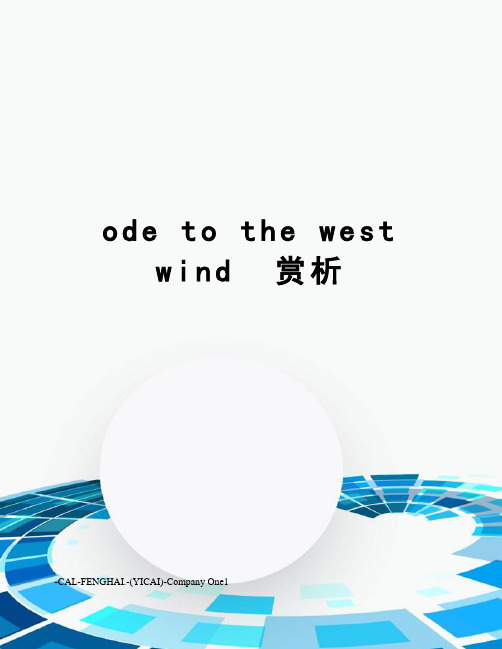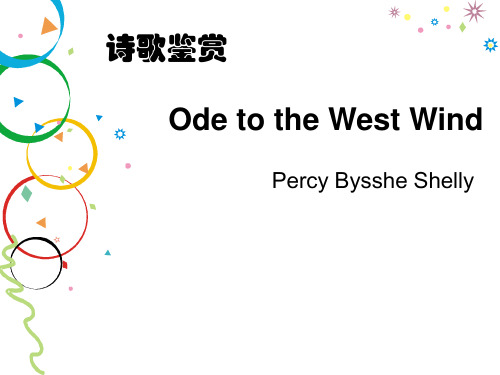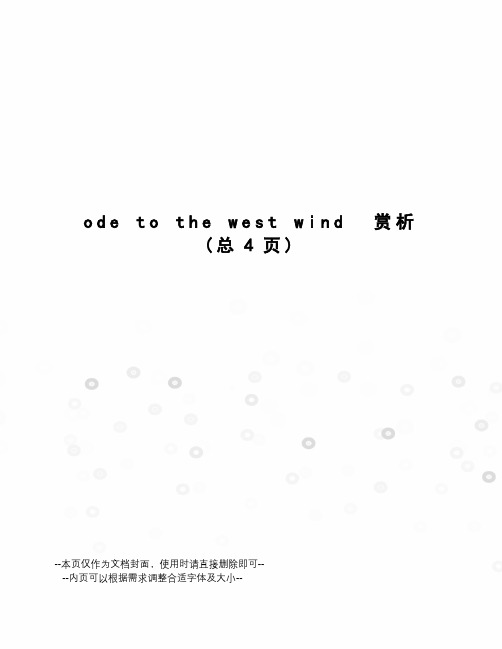英国文学史《西风颂》Ode_to_the_West_Wind赏析共45页文档
odetothewestwind赏析

o d e t o t h e w e s tw i n d赏析-CAL-FENGHAI.-(YICAI)-Company One1Luna ShenJim FairchildLiterature of the Romantic Period10/01/12Transforming image in Shelley 's poetry--See through Ode to the West WindThe west wind was widely adopted in Shelley 's poetry. In his poems, the west wind is always embedded with strong and violent power, which can cause the leaves to fall down onto the floor and tears the clouds high in the sky. Moreover, it can also cause panic of the sea plants and wake up the sleeping ocean. The west wind, according to Shelley, can be regarded as strong power in the revolutionary movement. Also, the poet's eagerness and courage to be integrated with west wind also indicate that she is willing to contribute hisself to the revolutionary movement. The poet believes that positive power will definitely overwhelm the evil and the darkness. Righteousness is surely to win in the revolutionary movement.In the first stanza, the poet adopted the color contrast tactic and described the scene when west wind swept autumn--"Yellow, and black, and pale, and hectic red", indicating that turbulent west wind blew down leaves and spread the seeds into land again, waiting for the arrival of spring. In the sentence, people could imagine a fading scene full of fallen leaves. However, when the spring comes, colors will turn soft and bright-- "colors and fragrance will be spread over mountains and plains". The poet proved himself to be "color" player, in severallines of whose poems, the changing process of the nature, from dull to prosperous, was perfectly presented. Finally, the poet names the ubiquitous west wind as both "destroyer and protector," which includes certain understanding that west wind break the old world and create a completely new world. According to Maharishi, "The nature of life is to grow," west wind is the power of developing.In the second stanza, the perspective of the poet switched to the sky and described how west wind blew burst the clouds and formed the storm. The poet adopted bolder imagination and regarded the air in the sky to be "waving hair of a madwoman". The so-called "madwoman" or "Maenad", is a character in Greece mythology. She was used to be drawn in an furious image in ancient painting. It is the furious appearance and scattering hair that perfectly portray natural wonders with random floating clouds. This also indicates that nature is both mysterious and dangerous.In the third stanza, the view was switched from the high sky to the ocean. Shelley mainly described how the west wind woke up the ocean and caused panic among sea pants. Prior to the arrival of the west wind, the sea was as calm as if it has slept for a whole summer. Moreover, it also saw the "ancient palace and pavilions" in its dream. The readers were also able to see reflection of the pavilions the clear water and the ripples formed a scene with full-bodiedly beauty. Then, the sea was also embedded with also personality, who, prior to the arrival of west wind, actively split itself and exposed the sea plants which hid deeply at the bottom of the sea. This peculiar description seems to be completely broad imagination of thepoet, while also complies with the law of nature.In the above three stanzas, the poet described how the west wind swept from the sky to the sea. However, in the fourth stanza, the poet focused on himself and wished that the wester wind could took him away, like the way it did to leaves, clouds and ripples in the sea. The poet was eager to float in the world freely. In order to demonstrate speed of the west wind and the poet's eagerness, the poet used a series of the same sentence pattern and formed a clanging and floating rhythm of the poetry.In fifth stanza, such kind of rhythm becomes more vehement and increasingly strong. The poet switched to a series of invocatory sentences, expressing his determination and courage to be integrated with the west wind. A famous aphorism was illustrated in a form of rhetorical questions , which seems as if the poet is asking the readers questions. The west wind seems to have stopped all of a sudden and poetry connotation of the poem suddenly becomes meaningful.Ode to the west wind is a poem to think high praise of west wind and a song of Shelley's. Shelley is a warm romantic poet, who is also a brave revolutionary soldier. He armed himself with poetries and took an active part in revolutionary movement. In spite of failures and setbacks, he still maintained at a high fighting spirit.Ode to the west wind is also the voice of the time. In the early 19th century, prior to emerging of scientific socialism and workers' movement in European countries was still in aspontaneous stage, Ode to the west wind inevitably contained a "mild, indirect and sorrow" tone. However, as pioneer socialist, Shelley held a firm and optimistic belief upon future of the revolutions and fate of the human beings. He firmly believed that justice would surely overwhelmed evil and light would definitely take place of the darkness. The poet, as a"talented prophet" announced that, "If winter comes, can spring be far behind"。
Ode to the West Wind中英文赏析解析

• • • • • • • •
IV If I were a dead leaf thou mightest bear; If I were a swift cloud to fly with thee; A wave to pant beneath thy power, and share The impulse of thy strength, only less free Than thou, O uncontrollable! If even I were as in my boyhood, and could be The comrade of thy wanderings over Heaven, As then, when to outstrip thy skiey speed Scarce seem'd a vision; I would ne'er have striven As thus with thee in prayer in my sore need. Oh, lift me as a wave, a leaf, a cloud! I fall upon the thorns of life! I bleed! A heavy weight of hours has chain'd and bow'd One too like thee: tameless, and swift, and proud.
• • •
III Thou who didst waken from his summer dreams The blue Mediterranean, where he lay, Lull'd by the coil of his crystalline streams, Beside a pumice isle in Baiae's bay, And saw in sleep old palaces and towers Quivering within the wave's intenser day, All overgrown with azure moss and flowers So sweet, the sense faints picturing them! Thou For whose path the Atlantic's level powers Cleave themselves into chasms, while far below The sea-blooms and the oozy woods which wear The sapless foliage of the ocean, know Thy voice, and suddenly grow gray with fear, And tremble and despoil themselves: oh hear!
odetothewestwind赏析

o d e t o t h e w e s t w i n d赏析(总4页)--本页仅作为文档封面,使用时请直接删除即可----内页可以根据需求调整合适字体及大小--Luna ShenJim FairchildLiterature of the Romantic Period10/01/12Transforming image in Shelley 's poetry--See through Ode to the West WindThe west wind was widely adopted in Shelley 's poetry. In his poems, the west wind is always embedded with strong and violent power, which can cause the leaves to fall down onto the floor and tears the clouds high in the sky. Moreover, it can also cause panic of the sea plants and wake up the sleeping ocean. The west wind, according to Shelley, can be regarded as strong power in the revolutionary movement. Also, the poet's eagerness and courage to be integrated with west wind also indicate that she is willing to contribute hisself to the revolutionary movement. The poet believes that positive power will definitely overwhelm the evil and the darkness. Righteousness is surely to win in the revolutionary movement.In the first stanza, the poet adopted the color contrast tactic and described the scene when west wind swept autumn--"Yellow, and black, and pale, and hectic red", indicating that turbulent west wind blew down leaves and spread the seeds into land again, waiting for the arrival of spring. In the sentence, people could imagine a fading scene full of fallen leaves. However, when the spring comes, colors will turn soft and bright-- "colors and fragrance will be spread over mountains and plains". The poet proved himself to be "color" player, in severallines of whose poems, the changing process of the nature, from dull to prosperous, was perfectly presented. Finally, the poet names the ubiquitous west wind as both "destroyer and protector," which includes certain understanding that west wind break the old world and create a completely new world. According to Maharishi, "The nature of life is to grow," west wind is the power of developing.In the second stanza, the perspective of the poet switched to the sky and described how west wind blew burst the clouds and formed the storm. The poet adopted bolder imagination and regarded the air in the sky to be "waving hair of a madwoman". The so-called "madwoman" or "Maenad", is a character in Greece mythology. She was used to be drawn in an furious image in ancient painting. It is the furious appearance and scattering hair that perfectly portray natural wonders with random floating clouds. This also indicates that nature is both mysterious and dangerous.In the third stanza, the view was switched from the high sky to the ocean. Shelley mainly described how the west wind woke up the ocean and caused panic among sea pants. Prior to the arrival of the west wind, the sea was as calm as if it has slept for a whole summer. Moreover, it also saw the "ancient palace and pavilions" in its dream. The readers were also able to see reflection of the pavilions the clear water and the ripples formed a scene with full-bodiedly beauty. Then, the sea was also embedded with also personality, who, prior to the arrival of west wind, actively split itself and exposed the sea plants which hid deeply at the bottom of the sea. This peculiar description seems to be completely broad imagination of thepoet, while also complies with the law of nature.In the above three stanzas, the poet described how the west wind swept from the sky to the sea. However, in the fourth stanza, the poet focused on himself and wished that the wester wind could took him away, like the way it did to leaves, clouds and ripples in the sea. The poet was eager to float in the world freely. In order to demonstrate speed of the west wind and the poet's eagerness, the poet used a series of the same sentence pattern and formed a clanging and floating rhythm of the poetry.In fifth stanza, such kind of rhythm becomes more vehement and increasingly strong. The poet switched to a series of invocatory sentences, expressing his determination and courage to be integrated with the west wind. A famous aphorism was illustrated in a form of rhetorical questions , which seems as if the poet is asking the readers questions. The west wind seems to have stopped all of a sudden and poetry connotation of the poem suddenly becomes meaningful.Ode to the west wind is a poem to think high praise of west wind and a song of Shelley's. Shelley is a warm romantic poet, who is also a brave revolutionary soldier. He armed himself with poetries and took an active part in revolutionary movement. In spite of failures and setbacks, he still maintained at a high fighting spirit.Ode to the west wind is also the voice of the time. In the early 19th century, prior to emerging of scientific socialism and workers' movement in European countries was still in aspontaneous stage, Ode to the west wind inevitably contained a "mild, indirect and sorrow" tone. However, as pioneer socialist, Shelley held a firm and optimistic belief upon future of the revolutions and fate of the human beings. He firmly believed that justice would surely overwhelmed evil and light would definitely take place of the darkness. The poet, as a"talented prophet" announced that, "If winter comes, can spring be far behind"。
Ode to the West Wind中英文赏析

Percy Bysshe Shelly
POET
Percy Bysshe Shelly (1792-1822)
• One of the major English Romantic Poets • Considered to be among the finest lyric poets in the English language
In this poem, the wind is more than simply a current of air. In Greek & Latin languages, the words for “wind”, “inspiration”, “soul”, and “spirit” are all related. So, Shelley’s “West Wind” seems to symbolize an inspiring spiritual power that moves everywhere, and affects everything.
•
• •
• • •
•
•
V
第五节
• • • •
•
• •
•
• •
•
• • •
Make me thy lyre, even as the forest is: What if my leaves are falling like its own! The tumult of thy mighty harmonies Will take from both a deep, autumnal tone, Sweet though in sadness. Be thou, Spirit fierce, My spirit! Be thou me, impetuous one! Drive my dead thoughts over the universe Like wither'd leaves to quicken a new birth! And, by the incantation of this verse, Scatter, as from an unextinguish'd hearth Ashes and sparks, my words among mankind! Be through my lips to unawaken'd earth The trumpet of a prophecy! Oh Wind, If Winter comes, can Spring be far behind?
Ode to the West Wind中英文赏析解析

Percy Bysshe Shelly
POET
Percy Bysshe Shelly (1792-1822)
? One of the major English Romantic Poets
? Considered to be among the finest lyric poets in the English language
? For whose path the Atlantic's level powers
? Cleave themselves into chasms, while far below
? The sea-blooms and the oozy woods which wear
? And saw in sleep old palaces and towers
? Quivering within the wave's intenser day,
? All overgrown with azure moss and flowers
? So sweet, the sense faints picturing them! Thou
? Yellow, and black, and pale, and hectic red,
? Pestilence-stricken multitudes: O thou,
? Who chariotest to their dark wintry bed
? The winged seeds, where they lie cold and low,
? Each like a corpse within its grave, until
Ode-to-the-West-Wind中英文赏析

假如冬天已到,难道春天还用久等?
Structure
• Part Ⅰ(Section 1-3): the connection between the West Wind and the earth, the air and the water
你激荡长空,乱云飞坠 落叶;你摇撼天和海,
• Angels of rain and lightning: there are spread
• On the blue surface of thine aery surge,
不许它们象老树缠在一堆; 你把雨和电赶了下来, 只见蓝空上你驰骋之处
• Like the bright hair uplifted from the head
• IV
第四节
• If I were a dead leaf thou mightest bear;
• If I were a swift cloud to fly with thee;
• A wave to pant beneath thy power, and share
假如我能是一片落叶随你飘腾, 假如我能是一朵流云伴你飞行, 或是一种浪头在你旳威力下翻滚,
• Part Ⅱ(Section 4-5): the poet expresses his own state of mind and explores the relationship between the West Wind and himself.
In this poem, the wind is more than simply a current of air. In Greek & Latin languages, the words for “wind”, “inspiration”, “soul”, and “spirit” are all related.
雪莱西风颂-如果冬天来了, 春天还会远吗-经典中英双语赏析

Ode to the West Wind(雪莱)If Winter comes, can Spring be far behind?如果冬天来了,春天还会远吗?O wild West Wind, thou breath of Autumn's being, Thou, from whose unseen presence the leaves deadAre driven, like ghosts from an enchanter fleeing,剽悍的西风啊,你是暮秋的呼吸, 因你无形的存在,枯叶四处逃窜, 如同魔鬼见到了巫师,纷纷躲避;Yellow, and black, and pale, and hectic red,Pestilence-stricken multitudes: O thou,Who chariotest to their dark wintry bed那些枯叶,有黑有白,有红有黄,像遭受了瘟疫的群体,哦,你呀,西风,你让种籽展开翱翔的翅膀,The winged seeds, where they lie cold and low,Each like a corpse within its grave, untilThine azure sister of the Spring shall blow飞落到黑暗的冬床,冰冷地躺下,像一具具尸体深葬于坟墓,直到你那蔚蓝色的阳春姐妹凯旋归家,Her clarion o'er the dreaming earth, and fill (Driving sweet buds like flocks to feed in air)With living hues and odours plain and hill:向睡梦中的大地吹响了她的号角,催促蒋蕾,有如驱使吃草的群羊,让漫山遍野注满生命的芳香色调;Wild Spirit, which art moving everywhere;Destroyer and preserver; hear, oh hear!剽悍的精灵,你的身影遍及四方,哦,听吧,你既在毁坏,又在保臧!Thou on whose stream, mid the steep sky's commotion, Loose clouds like earth*s decaying leaves are shed,Shook from the tangled boughs of Heaven and Ocean,在你的湍流中,在高空的骚动中,纷乱的云块就像飘零飞坠的叶子,你从天空和海洋相互交错的树丛Angels of rain and lightning: there are spreadOn the blue surface of thine a{:e}ry surge,Like the bright hair uplifted from the head抖落出传送雷雨以及闪电的天使;在你的气体波涛的蔚蓝色的表面,恰似酒神女祭司的头上竖起缕缕Of some fierce Maenad, even from the dim vergeOf the horizon to the zenith's height,The locks of the approaching storm. Thou dirge亮闪闪的青丝,从朦胧的地平线一直到苍天的顶端,全都披散着即将来临的一场暴风骤雨的发卷,Of the dying year, to which this closing nightWill be the dome of a vast sepulchre,Vaulted with all thy congregated might你就是唱给垂死岁月的一曲挽歌,四合的夜幕,是巨大墓陵的拱顶,它建构于由你所集聚而成的气魄,Of vapours, from whose solid atmosphere Black rain, and fire, and hail will burst: oh hear!可是从你坚固的气势中将会喷迸黑雨、电火以及冰雹;哦,请听!Thou who didst waken from his summer dreams The blue Mediterranean, where he lay,Lulfd by the coil of his cryst{"a}lline streams,你啊,把蓝色的地中海从夏梦中唤醒,它曾被清澈的水催送入眠,就一直躺在那个地方,酣睡沉沉,Beside a pumice isle in Baiae's bay,And saw in sleep old palaces and towers Quivering within the wave r s intenser day,睡在拜伊海湾的一个石岛的旁边,在睡梦中看到古老的宫殿和楼台在烈日之下的海波中轻轻地震颤,All overgrown with azure moss and flowersSo sweet, the sense faints picturing them! Thou For whose path the Atlantic's level powers它们全都开满鲜花,又生满青苔,散发而出的酹人的芳香难以描述!见到你,大西洋的水波豁然裂开,Cleave themselves into chasms, while far below The sea-blooms and the oozy woods which wear The sapless foliage of the ocean, know为你让出道路,而在海底的深处,枝叶里面没有浆汁的淤泥的丛林和无数的海花、珊瑚,一旦听出Thy voice, and suddenly grow gray with fear,41And tremble and despoil themselves: oh hear!你的声音,一个个顿时胆战心惊,颤栗着,像遭了劫掠,哦,请听!IVIf I were a dead leaf thou mightest bear;If I were a swift cloud to fly with thee;A wave to pant beneath thy power, and share假如我是一片任你吹卷的枯叶,假若我是一朵随你飘飞的云彩,或是在你威力之下喘息的水波,The impulse of thy strength, only less freeThan thou, 0 uncontrollable! If evenI were as in my boyhood, and could be分享你强健的搏动,悠闲自在,不羁的风啊,哪怕不及你自由,或者,假若我能像童年的时代,The comrade of thy wanderings over Heaven,As then, when to outstrip thy skiey speedScarce seem'd a vision; I would ne'er have striven陪伴着你在那天国里任意翱游,即使比你飞得更快也并非幻想一一那么我绝不向你这般苦苦哀求:As thus with thee in prayer in my sore need.Oh, lift me as a wave, a leaf, a cloud!I fall upon the thorns of life! I bleed!啊,卷起我吧!如同翻卷波浪、或像横扫落叶、或像驱赶浮云!我跃进人生的荆棘,鲜血直淌!A heavy weight of hours has chain'd and bow'dOne too like thee: tameless, and swift, and proud.岁月的重负缚住了我这颗灵魂,它太像你了:敏捷、高傲、不驯I。
西风颂 赏析

<西风颂>赏析一个秋日的午后,诗人雪莱在意大利佛罗伦萨近郊的树林里漫步。
突然狂风大作,乌云翻滚。
到了傍晚,暴风雨夹带着冰雹雷电倾盆而下,荡涤着大地,震撼着人间。
大自然威武雄壮的交响乐,触发了诗人的灵感,他奋笔疾书,谱写了不朽的抒情短诗《西风颂》。
这是1819年的事情。
当时,欧洲各国的工人运动和革命运动风起云涌。
英国工人阶级为了争取自身的生存权利,正同资产阶级展开英勇的斗争,捣毁机器和罢工事件接连不断。
1819年8月,曼彻斯特八万工人举行了声势浩大的游行示威,反动当局竟出动军队野蛮镇压,制造了历史上著名的彼得卢大屠杀事件。
雪莱满怀悲愤,写下了长诗《暴政的假面游行》,对资产阶级政府的血腥暴行提出严正抗议。
法国自拿破仑帝制崩溃、波旁王朝复辟以后,阶级矛盾异常尖锐,广大人民正酝酿着反对封建复辟势力的革命斗争。
拿破仑帝国的解体也大大促进了西班牙人民反对异族压迫和封建专制的革命运动,1819年1月,终于响起了武装起义的枪声。
就在武装起义的前夕,雪莱给西班牙人民献上了《颂歌》一首,为西班牙革命吹响了进军的号角。
在意大利和希腊,民族解放运动方兴未艾,雪莱的《西风颂》发表不久,这两个国家也先后爆发了轰轰烈烈的武装起义。
面对着欧洲山雨欲来风满楼的革命形势,雪莱为之鼓舞,为之振奋,诗人胸中沸腾着炽热的革命激情。
这时,在一场暴风骤雨的自然景象的触发下,这种难以抑制的革命激情立刻冲出胸膛,一泻千里,化作激昂慷慨的歌唱:你怒吼咆哮的雄浑交响乐中,将有树林和我的深沉的歌唱,我们将唱出秋声,婉转而忧愁。
精灵呀,让我变成你,猛烈、刚强!把我僵死的思想驱散在宇宙,像一片片的枯叶,以鼓舞新生;请听从我这个诗篇中的符咒,把我的话传给全世界的人,犹如从不灭的炉中吹出火花!雪莱在歌唱西风。
他歌唱西风以摧枯拉朽的巨大力量扫除破败的残叶,无情地把那“黑的、惨红的、铅灰的,或者蜡黄,患瘟疫而死掉的一大群”垃圾扫除干净;他歌唱西风“在动乱的太空中掀起激流”,搅动着“浓云密雾”,呼唤着“电火、冰雹和黑的雨水”,“为这将逝的残年唱起挽歌”;他歌唱西风唤醒沉睡的浩翰大海,波涛汹涌,把一丛丛躲藏在海底深处的海树海花,吓得惊恐色变,“瑟瑟地发抖,纷纷凋谢”。
